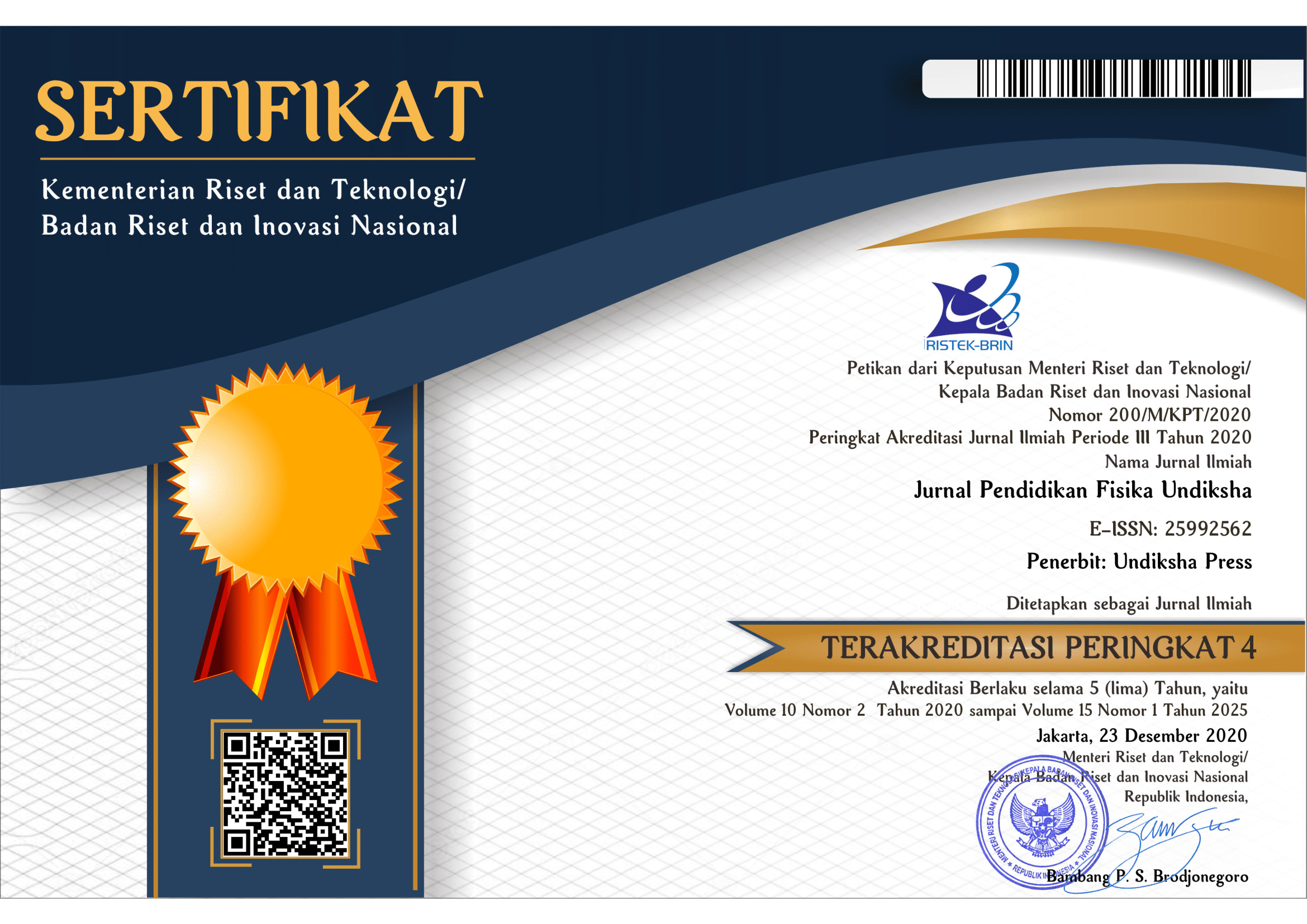PENGARUH MODEL PROBLEM-BASED LEARNING (PBL) BERBANTUAN PETA KONSEP (CONCEPT MAPPING) TERHADAP HASIL BELAJAR SISWA KELAS VIII SMP NEGERI 2 SINGARAJA TAHUN PELAJARAN 2013/2014
DOI:
https://doi.org/10.23887/jjpf.v1i1.3510Abstract
Penelitian ini bertujuan untuk menganalisis perbedaan hasil belajar siswa yang belajar menggunakan model problem based-learning berbantuan peta konsep (MPBL-CM), model problem based-learning (PBL), dan model pembelajaran langsung (DI). Jenis penelitian ini adalah eksperimental semu dengan desain penelitian pretest-posttest nonequivalent control group design. Populasi penelitian ini adalah seluruh siswa kelas VIII SMP Negeri 2 Singaraja tahun pelajaran 2013/2014 yang berjumlah empat belas kelas. Sampel diambil dengan teknik random sampling. Sampel terdiri dari tiga kelas (VIII2, VIII3, dan VIII4) dengan jumlah 120 siswa. Data yang diperlukan dalam penelitian ini adalah data hasil belajar siswa yang dikumpulkan dengan tes hasil belajar. Tes hasil belajar berbentuk pilihan ganda yang terdiri dari 20 butir soal. Data hasil belajar fisika siswa menggunakan skor gain ternormalisasi. Pengujian hipotesis menggunakan ANAVA satu jalur dan uji lanjut Least Significant Difference (LSD) untuk menguji komparasi pasangan skor rata-rata hasil belajar tiap kelompok perlakuan. Semua pengujian hipotesis dilakukan pada taraf signifikansi 5%. Hasil pengujian menunjukan terdapat perbedaan hasil belajar fisika siswa antar kelompok MPBL-CM, MPBL, dan DI (F = 46,962; p<0,05). Hasil belajar fisika siswa yang belajar dengan model DI dan siswa yang belajar dengan MPBL berada pada kualifikasi rendah (M = 0,27; SD = 0,12) dan (M = 0,27; SD = 0,10), sedangkan hasil belajar fisika siswa yang belajar dengan MPBL-CM berada pada kualifikasi sedang (M = 0,48; SD = 0,12). LSD menunjukan hasil belajar fisika siswa pada kelompok DI lebih tinggi dibandingkan dengan kelompok MPBL (Δµ = 0,1418). Hasil belajar fisika siswa pada kelompok MPBL-CM lebih tinggi dibandingkan dengan kelompok DI (Δµ = 0,20667). Hasil belajar fisika siswa pada kelompok MPBL-CM lebih tinggi dibandingkan dengan kelompok MPBL (Δµ = 0,22086).Kata Kunci : model problem based-learning berbantuan peta konsep, model problem based-learning, direct instruction, hasil belajar.
This research aimed at analyzing the differences of learning outcome among the students who were taught by using Concept Map Problem Based Learning Model (MPBL-CM), Problem Based Learning Model (PBL), and Direct Instruction Model (DI). Quasi experimental of one way pretes-posttest non-equivalent control group design was used. The research population consisted of eighth grade students of SMP Negeri 2 Singaraja in academic year 2013/2014 which consisted of 14 classes. Sample was obtained randomly by using random sampling which consisted of 3 classes (VIII2, VIII3, and VIII4) with the number of students was 120. Data collected in this research was the students physics learning outcome which were collected by 20 item in from of optional test. The data were collected by normalize gain score. The experiment hypothesis used was one way ANAVA, and then advanced assessment LSD for determining the comparison of the learning outcome average score for each group was used. All of the experiment hypothesis were conducted by significant level of 5%. The result of this research shows that there is a significant difference of students' physics learning outcome among group MPBL-CM, MPBL, and DI (F=49,962; p<0,05). The physics learning outcome of students who learn through DI model and the students who learn through MPBL are in the low qualification [(M=0,27; SD=0,12) and (M=0,27; SD=0,10)], while the physics learning outcome of students who learn through MPBL CM is in fair qualification (M=0,48; SD=0,12). LSD analysis shows that the students physics learning outcome at DI group is higher than at MPBL group (Δµ = 0,1418). The physics learning outcome of students at MPBL-CM group is higher than at DI group (Δµ=0,20667). The physics learning outcome of students who are at MPBL-CM group is higher than at MPBL Group (Δµ = 0,22086).
keyword : Concept Mapping Scaffolding Problem Based Learning Model, Problem Based Learning Model, Direct Instruction Model, Learning outcome
Published
2014-07-17
Issue
Section
Articles
License

Jurnal Pendidikan Fisika Undiksha is licensed under a Creative Commons Attribution-ShareAlike 4.0 International License.






